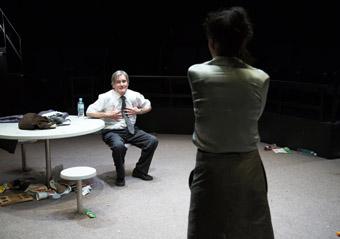in the dead of night
keith gallasch sees harrower’s blackbird at stc

Peter Kowitz, Paula Arundell, Blackbird
photo Tania Kelley
Peter Kowitz, Paula Arundell, Blackbird
IN CATE BLANCHETT’S IN-THE-ROUND PRODUCTION OF SCOTS PLAYWRIGHT DAVID HARROWER’S BLACKBIRD, MAX LYANDVERT SHAPES OUR EXPERIENCE WITH A WRAP-AROUND CONSTRUCTED ACOUSTIC RESONATING WITH THE SOUND OF DISTANT CONVERSATIONS, SLAMMED DOORS, RATTLING PIPES, PASSING FOOTSTEPS AND OBJECTS BEING MOVED ABOUT. THE SOUND DESIGN FRAMES THE SPACE, FOR THE STAGE DESIGN SIMPLY COMPRISES SEVERAL FLUORO-LIT DOORS INTO IMAGINARY CORRIDORS AND IS DRESSED ONLY WITH A CHEAP TABLE AND CHAIRS, GREY CARPET AND LITTER. THE ROOM LOOKS AND FEELS LIKE ONE OF THOSE INDETERMINATE SPACES IN A LARGE BUILDING WHERE STAFF HIDE OUT FOR A SMOKO OR OTHER ILLICIT BEHAVIOUR.
The hollow acoustic heightens the sense of emptiness and regret in the lives of the play’s antagonists and delivers moments of suspense as a passerby seems about to enter, stalling the confrontation, and shock when someone does. The struggle is between a caretaker, Ray, in his 50s and Una, the young woman he seduced when she was 12. She’s done some detective work to find him and initially he doesn’t recognise her. The play is built around the push and pull of hatred and the residue of attraction, the desire for revenge and a plea for forgiveness, all heading towards the pivotal telling, in consecutive monologues, of what happened on the night when he abandoned her as a child in the hotel to which they’d absconded.
Harrower’s tautly spare, but curiously literary writing is at its best in his portrayal of Ray, who for all his apparent sincerity actually gives little away, withholding information rather than lying and thus providing the momentum for the final revelation. A restrained Peter Kowitz plays Ray with quiet, nervous reserve. His assertions that the relationship was a one-off, that he was never a paedophile, that he burned the photographs he’d taken, that he really loved the 12-year-old Una, rekindles a moment of perverse passion in the pair, although it is beyond Ray (guilt? impotency?) to follow through. Ultimately, what is cruelly clear is that the woman remains forever a damaged child. As she said earlier to Ray, “You made me.” Perhaps Ray has been destroyed too by guilt and prison, though we can never be sure.
Paula Arundell imbues Una with steely determination, explosive anger and a strong sense of justice (at Ray’s trial the judge accused her of “suspiciously adult yearnings”), but also with moments of vulnerability and uncertainty, evidence that she is still locked in an emotional loop with her seducer—as the play’s final image confirms.
Blanchett, as we might expect, draws intense, studied performances from her actors, but the conventional blocking, the overly fast pacing of the production, even the inwardness of working in-the-round, gravitate against the emotional impact of each successive stage of Harrower’s play. Perhaps the playing became more measured later in the season, but on opening night Ray stayed too easily in the thrall of his accuser, the recovery from the pair’s bout of violence was too quick, and the mutual kicking about of rubbish embarassingly perfunctory, hardly evidence of the desperate release sought at this stage of tortuous mutual entrapment.
The STC Blackbird warranted seeing for the convincing performances of Kowitz and Arundell, and for Max Lyandvert’s sonic encapsulation of actors and audience—though not the melodramatic underscoring of the play’s final moment.
Blackbird is a short work on the page but the scale of its moral complexities and emotional compulsiveness demands an opening out on stage, spatially and temporally. Daniel Schlusser’s account of the productions by Peter Stein in Edinburgh and Benedict Andrews in Berlin, as reported by Melbourne theatre director Daniel Schlusser for RealTime [RT71, p10], suggests very different approaches, not least a greater ritualisation of this co-dependent relationship and more radical attitudes to time and space.
Sydney Theatre Company, Blackbird, writer David Harrower, director Cate Blanchett, performers Peter Kowitz, Paula Arundell, Danielle Catanzariti, designer Ralph Myers, lighting designer Nick Schlieper, composer sound designer Max Lyandvert; Wharf 1, Sydney, Dec 15,2007-Feb 16,2008
RealTime issue #83 Feb-March 2008 pg. 40






